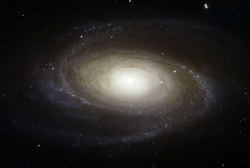The Cygnus X1 black hole is 7 billion times the mass of our sun and has a diameter the size of the orbit of Pluto.  I've always been fascinated with the night sky. As a kid I used to take my guitar out into the front yard and night to sit on a brick step and play where nobody could hear me but the stars. It was an inspiration like no other. Now I have a decent amateur telescope, a Meade Polaris 6-inch reflector, and live in one of the least populated areas of the country where the heavens shine in all their glory undiluted by city lights. I grew up in a small town with relatively dark skies, but living in Seattle for decades I had forgotten just how brilliant and stunning the cosmic scene could be. One of the first things I did when we got settled down here was grab my star atlas and look for the Andromeda galaxy. It's the one in this picture, the iconic Hubble Space Telescope image, the galaxy we tend to picture in our minds when the word is mentioned. Among the billions of galaxies we know about, Andromeda is remarkable in several ways--unique, in fact. First, it is the closet major galaxy to our own (discounting two small satellite galaxies that revolve ours like moons). Second, it's the only galaxy outside our own that can be seen with the naked eye--though you need ideal conditions and a good idea both where to look and what to look for. Third, and this is the one I find the most mesmerizing: Andromeda is not receding from the Milky Way. It's heading toward us. The world was shocked when Edwin Hubble discovered in 1923 that some of the amorphous blobs in the night sky were actually "island universes" separated by unimaginable distance from the one we live in. The aftershock was just as great six years later when Hubble found that the univese was expanding: every galaxy in the cosmos was racing away from us at tremendous speed. Well, not every galaxy. Andromeda, of the same class and somewhat larger than the Milky Way, is on a collision course with us. It's going to happen. One day in the distant future Andromeda and the Milky Way will collide, eventually fusing into a single system with each of its constituents' original shapes obliterated by the crash. It's nothing we should worry about though: significant gravitational contact between the galaxies is four billion years away, and by that time our sun will be starting to run out of hydrogen and preparing to explode. If the human species survives to see the galactic fusion, we'll need to have found someplace else to live.) Andromeda isn't too hard to find. Everybody knows the constellation Cassiopeia, the big W, and the second dip in the W points right to it. Part of the constellation Pegasus lies just a short ways (visually) below the W, looking like a very long, thin V lying on its side with a bend in each spoke like knees on a pair of legs; and if you look just above the uppermost knee, the one closest to Cassi's W, Andromeda is there, looking like a very faint grey oval splotch. I can find it now without the telescope, and even that gives me the same shudders I felt when I first caught it in the lens. It scares me. Andromeda is 2 million light-years away--so what we're really seeing is how it looked 2 million years ago--and the fact that we can see it at all over that astonishing distance gives an indication of what a truly massive object it is. The enormity of it gives me the creeps. And the knowledge that it's bearing down on us--that one day our entire sky will fill with an image like the one above--is mind-blowing. There are nights I can't even look at Andromeda because the sight of it shakes me that hard. Honestly, though we can see it, I don't believe we can't really picture it, how vast and complex and full of secrets our neighboring galaxy is. And Andromeda is hardly alone in inspiring that kind of awe. I read a lot of science books and I recently finished one about the discovery of pulsars and confirmation of the existence of black holes in the 1970s and 80s. You don't have to delve far into that subject matter to find things even more frightening than a galactic crash. The very first black hole discovered--a massive X-ray emitter in the constellation Cygnus--is just terrifying. It wasn't discoverd first for no reason: it is GIGANTIC. The Cygnus X1 black hole is 7 billion times the mass of our sun and has a diameter the size of the orbit of Pluto. There's not time or space here for me to give a full explanation of black holes and what these statistics imply, but if that description doesn't drop your jaw then you don't understand it or you're not paying attention. :) I don't think the human mind is capable of truly comprehending things like galactic distance or the reality of black holes, just like we can't picture a four-dimensional object or truly understand concepts like time and infinity. And there's the tie-in to The Just Beyond. The book deals with these subjects, and the trilogy, primarily the final book, is going to involve black holes and cosmological topology in a way that's intimately integrated into the plot. And the reason for that, it will be no surprise, is my utter fascination with these concepts that strain our mental capacity. I find them every bit as awesome and humbling as the concept of God...and, like the professor Dan Hendrick in the first book, what it really comes down to is that I see them as the same thing. We don't need movies and novels to expose us to divine power beyond our ability to reason: the night sky surrounds us with it. The science fiction of its nacent years gripped me in a way that most of today's writing does not, and it's not just because I was young. Under the pressure cooker of the Cold War, with the Apollo Program placing space exploration front and center on the human agenda, and with the rash of new discoveries and speculations about concepts like black holes and extra dimensions creating a pervasive sense of dark mystery, those stories made it feel as though a reality right out of the Twilight Zone might confront us around every corner. And the thing is--if you really make an effort to understand what science has revealed over the past century--it has. I'll never be an Asimov or Clarke or Bradbury. I don't have that kind of genius. But I'm shooting at least to create a similar feeling with the Beyond books. And I will make at least one more attempt to write a solid straight science fiction novel. I'll do it as soon as I'm confident I have The Right Idea. With my science books and my telescope, the bright image of Jupiter gazing down through the window when I wake up at night, there's no lack of inspiration. :) - Mark
0 Comments
Leave a Reply. |
Once upon
|
| The Just Beyond |
|

 RSS Feed
RSS Feed
